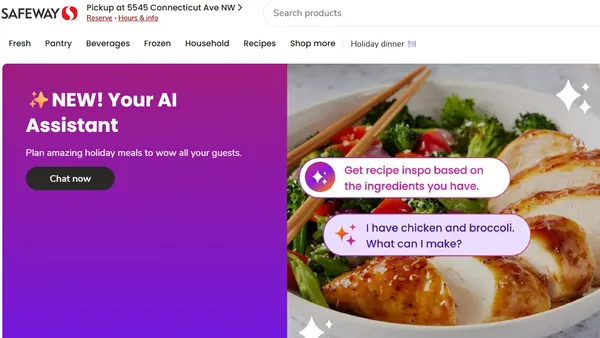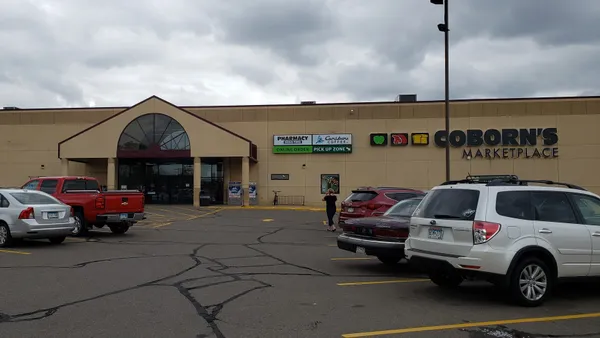Dive Brief:
- Albertsons has partnered with Akos, a virtual health solutions company and AdviNow to introduce virtual medical clinics that use artificial intelligence (AI) that can be found inside five Phoenix-area Safeway stores, according to a release. The company held a grand opening Thursday at one store in Tempe.
- Patients of the clinic follow steps on a computer screen powered by augmented reality, which will help them use an array of FDA-approved medical devices to collect data like weight, temperature, blood pressure, blood oxygen content, images of ears, throat, and nose, as well as chest, lung, and abdomen sounds. The process takes about 15 minutes and the workup is then sent to an Akos provider. The provider then chats with the patient through a video consultation to confirm the information collected, verify the diagnosis and confirm or change the treatment plan set by the system.
- The AI also sends the patient's prescription and/or test orders to a lab, pharmacy or imaging center and processes the billing. It is also programed to check in with the patient to schedule a follow-up visit. The technology was developed with the help of Arizona State University students and interns.
Dive Insight:
Grocery retailers aren't just a place to check off items on your food list anymore. Many convenience-seeking consumers now expect a full experience from their local grocery stores that not only includes healthy and fresh products but also one-stop-shopping. They've turned into clothing stores, restaurants and, more recently, health and wellness destinations. Albertsons' decision to dip its toes into health services seems like a natural progression.
Many grocery chains have added in-store pharmacies to give customers the option to pick up prescriptions and food in one place. By building in pharmacies, grocery stores are looking to keep consumers in-store versus opting to pick up prescriptions, groceries and non-food items at traditional pharmacies, convenience stores or big box retailers. This move shows that grocers are fighting back even harder against stiff competition from the likes of CVS, who recently merged with health insurance company Aetna, making it a powerhouse for health-related products.
Prior to Albertsons' Safeway, an in-store clinic was added to Hy-Vee's new standalone HealthMarket store in July, and last year Centene, an insurance company focused on managed care, opened a full-service clinic in a Missouri-based Schnuck Markets.
Food retailers are also relying on dietitians more as margins continue to thin. Along with Hy-Vee's in-store dietitian, Raley's has also created a nutritional strategist role, which helps personalize nutrition for consumers. In Brookline, Massachusetts, clinicians write "veggie scripts" for customers looking to manage weight and blood pressure. Outside of traditional grocery stores, even hospitals have tapped into grocery to focus on health and wellness.
Although pharmacies and clinics may not drive in profits for grocers, they could pay off in the long run. According to a 2017 Food Marketing Institute report, 81% of retailers believe that the health and wellness segment shows growth in the coming years. And 89% of retailers surveyed said they have a health and wellness outlet for customers, employees or both. By looking at these numbers from last year, it seems most grocers already offer some sort of health service so Safeway may be a little late to the game. Its AI-powered medical technology could, however, give it an edge over others and help it gain back customers lost to drug stores.










